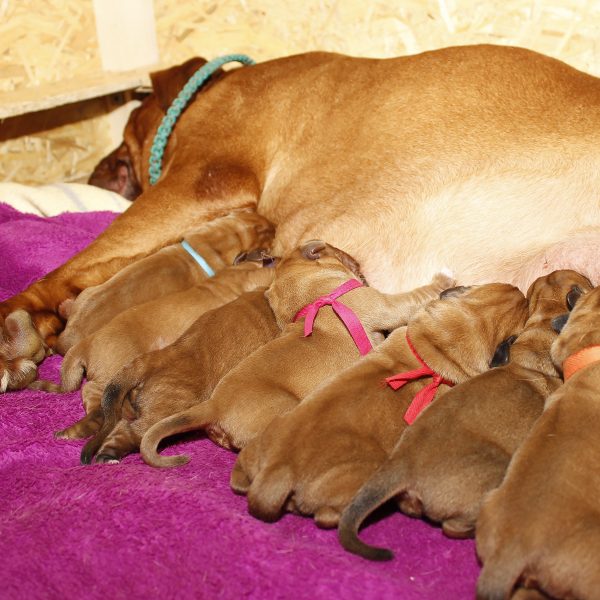How to Care for a Pregnant Dog
 If you’ve been planning to help your dog bring new puppies into the world, her pregnancy can be an exciting time! Before and during your pooch’s pregnancy, you should educate yourself on how to care for her. It’s important to ensure that she gets the proper nutrition and vet care and that she feels safe and happy for a healthy pregnancy. Here’s how to care for a pregnant dog:
If you’ve been planning to help your dog bring new puppies into the world, her pregnancy can be an exciting time! Before and during your pooch’s pregnancy, you should educate yourself on how to care for her. It’s important to ensure that she gets the proper nutrition and vet care and that she feels safe and happy for a healthy pregnancy. Here’s how to care for a pregnant dog:
What to Expect When Your Dog is Expecting
Dogs are normally pregnant for about 63 days. Similar to humans, pregnancy in dogs is divided into three trimesters of equal length.
For the first few weeks, your dog likely won’t show many signs that she’s pregnant. She may gain a little weight, but other than that she will show no changes.
During the third or fourth week, changes in her hormones may cause a little morning sickness. If she seems tired and avoids food, then offer her small meals throughout the day.
Veterinary Care
You should take your dog to the vet three or four weeks after she’s mated. The vet will first confirm the pregnancy. Then give her any necessary tests, and treat her for things that could threaten her pregnancy – like parasites. The vet can give your pregnant dog an ultrasound as early as three weeks in.
Being Gentle
Between the 28th and 35th days of pregnancy, it’s possible to feel walnut-sized puppies inside your dog. However, you shouldn’t try this yourself – only someone trained in vet care can do it safely.
When your dog is pregnant, you should be very careful about how you handle her. Her puppies are fragile and could be harmed if her belly is touched too roughly. Pregnancy is also one of the reasons why dogs make nests. You can help your pregnant dog be more comfortable by providing a good bed and soft blankets for her to make a nest and relax.
Exercise
Exercise is important! It helps to preserve your dog’s well-being and keeps her in good shape during pregnancy. You should make sure she gets regular – but not strenuous – exercise.
Nutrition
Be careful if you choose to give your dog supplements. Getting too high a dose of certain nutrients can harm the puppies. In fact, a supplement may not even be necessary if you’re feeding her a high-quality dog food that’s fortified with all the essential vitamins and minerals.
If you’re unsure of how to best meet your dog’s nutritional needs, it’s a good idea to talk with your vet. The American Kennel Club recommends that as your dog gains weight in the final five weeks, you should gradually increase the amount that you feed her. Work up to giving her 35-50% more than usual. She should be fed in small meals throughout the day as larger meals might make her feel uncomfortable.
Whelping
When dogs give birth, it’s called “whelping”. Your vet can determine your dog’s whelping date by testing her hormone levels. Toward the end of her pregnancy, set up a “whelping box” to give her some time to feel comfortable and safe in it. After all, if she doesn’t like it when the time comes, she might pick one of her favorite spots in the house! You probably don’t want your pooch to deliver on the carpet.
If you’re a newbie with delivering puppies at home, have an extensive conversation with your vet. Talk about what you need to do during the delivery and how to care for newborn puppies. Make sure you are prepared with all the supplies you will need. If you know any experienced breeders, this is a good time to call in a favor – ask if they’ll be present during the birth.
If you’ve never cared for a dog during pregnancy before and are feeling clueless, don’t be nervous! There is plenty of information out there, and you probably have a great vet who will provide guidance and education.
